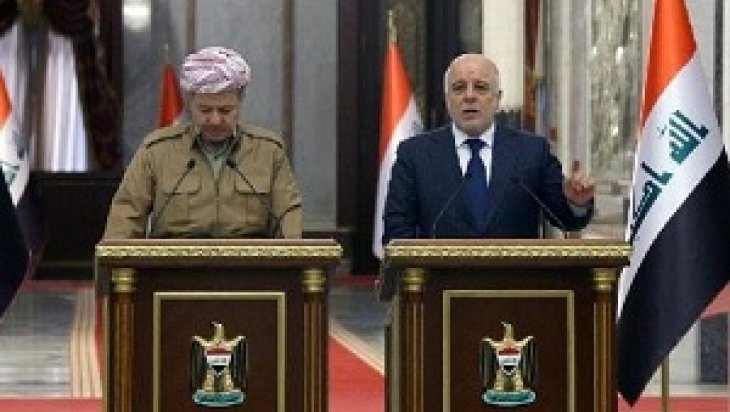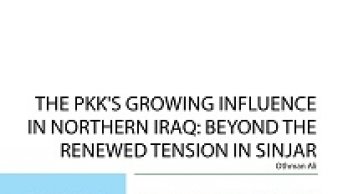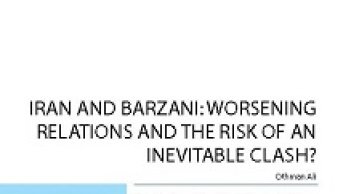Why Barzani Visited Baghdad: Is It the Start of a New Era between Erbil and Baghdad?

Some Iraqi and Kurdish politicians have viewed Masud Brazani's, the head of Kurdistan Regional government (KRG), visit to Baghdad on 29 September as the beginning of a new era in Iraq's rapidly changing political landscape. We maintain that the relations between Erbil and Baghdad are too complicated to be settled any time soon. There are no changes in the mutually felt distrust and enmity between the two sides, as well. In addition, the areas of disagreement which separate the two sides are too many to be easily addressed. Nevertheless, thereare internal compelling reasons and tremendous amount of external pressure from the United States on both sides to close ranks for a while
Following a meeting with the Iraqi prime minister in Baghdad, KRG president andKDP leader Masoud Barzani said that Erbil still maintained relations with Iraq and that both sides sought to solve all disputes through dialogue and understanding. He added, "we are here to give our unwavering support to Mr. Abadi. We view Baghdad our strategic depth and we find that the political atmosphere in Baghdad is promising." Barzani said at a joint press conference with Prime Minister Haider al-Abadi that he has reached an agreement with Prime Minister Haider al-Abadi to solve all problems, including the economic crisis, oil and gas issues, and the challenges of defeating ISIS. Haider al-Abadion his part stated that his government works “for the national reconciliation and the prosperity for all Iraqis." Abadi said, "The issue of Kirkuk’s oil must be resolved, we want to give more power to the governorates and the Kurdistan Region will benefit."
At the first glance the reading of these statements gives the impression that both KRG and Baghdad government have started a new era in their relationship.However, an analysis of the internal and external reasons which have paved the way for this meetingreveals that this is merely a temporary truce on the on-going rhetorical war between Erbil and Baghdad. We need to keep in mind that both al-Abadi and Barzani have committed themselves to totally opposing political objectives. These two men have never met for the last five years except for short one in Paris. Al-Abadi is a leading member of Dawa party andhas a record of opposing giving any concession to the Kurds. While he was a member of the Financial Committee in Iraqi Parliament during 2009-2014, he was the architect of the former PMNuri al-Maliki’s policy of financial blockade of KRG. Barzani, on his part, has been recently crusading hard both at home and abroad for holding referendum on independence of KRG and his mentioned statement on Iraq being a "strategic depth of Kurdistan" can hardly agree with this.
Internal Opposition
Both sides are facing off stiff opposition in their home front. Recently, al-Maliki has been making slow but steady in-roads back to power.Maliki also has strong and special ties with the Popular Mobilization Units (PMU) that give him considerable influence on Iraq's political and security scene. Although al-Abadi has stripped him of his official post as vice-President in August last year, he currently leads aparliamentary bloc named al-Islah(reform) which has around 100 members (one third of the members of the Parliament). The members of this bloc are from the Shiite groups such as Dawa,Fazila, Badr, and few Sunni law-makers who split from their groups. The bloc is behind the recent dismissal of several ministers as part of a plan to bring down the government of al-Abadi and pave the way for Maliki's return to power either through a coup utilizing a chaotic situation or through the next election. On September 22, Hoshyar Zebari, the recently deposed Finance Minister,told Rudaw that Parliament Speaker Salim al-Jabouri, in collusion with the State of Law Coalition, dismissed him "as a part of the Maliki project in using parliament to achieve "illicit goals." The pro-Maliki bloc did not hide its anger at al-Abadi nor its desire to see him be replaced with al-Maliki. Haitham al-Jabouri, who is also the spokesperson for the Islah Bloc told Al-Ghad Press on September 10, “Abadi has failed to manage the country and to fulfill his promises…He has reached the stage of not being able to lead the country...". Being aware of this power struggle in Baghdad,Barzani stated in the joint press conference that he is in Baghdad to give "unwavering support to al-Abadi."
The support of KRG is also important in any future government formation. Therefore, in July, al-Maliki made a sudden visit to Sulaymaniyah to meet PUK and Gorran Movement, who are involved in a bitter power struggle with Barzani, to discuss the future of the frosty relations between KRG and Baghdad. This was followed by PUK and Gorran members visiting Baghdad.Barzani was irritated by this and opened his channels with al-Abadi through the Americans. For this reason, Barzani has deliberatelyincluded within his delegation several leading members of PUK leadership in his recent visit to Baghdad in order to signal to Shiite groups that they could not sideline him. The visit has angered pro-Maliki bloc in the parliament andthey asked openly for the arrest of Barzani on the charges of conspiring with terrorist organization and foreign countries against Iraqi national interest.
External Pressure
The external pressure hadalso a share in this sudden change of heart on the part of Barzani and al-Abadi. The battle for Mosul and the war against ISIL in Syria and Iraq has earned a significant relevance in US presidential elections. President Obama considers a quick victory in Mosul a foremost priority of his foreign policy objectives. A lack of decisive victory or an immediate confrontation between Iraqi forces and Kurdish peshmerga forces during or after the battle of Mosul will have a serious reversal impact on the Democratic presidential candidate. The PUKcontrolledMillet Press has reported on September 29 that during the last three months US officials were involved in an intensive shuttle diplomacy between Erbil and Baghdad to encourage al-Abadi and Barzani to close ranks and coordinate efforts to expel ISIL from Mosul. A statement issued by KRG official press on the day Barzani was heading towards Baghdad,has indicated that he had received a call from Joe Biden, the US vice-President, calling upon him to come to terms with al-Abadi. This explains the fact that Mosul battle and the subsequent refugee issue were the focus of the meeting, and that the only tangible thing which came out of the Barzani's visit to Baghdad was the formation of a joint military command between peshmaga and Iraqi forces. Although, both sides agreed to form in future committees to address Kirkuk and oil issues, many in KRG are doubtful that al-Abadi has either the power or the desire to settle these complicated matters in which neither side can afford to make any serious and genuine compromises.
For these reasons, it is hard to view the Barzani's visit to Baghdad anything but a tactical move by both sides,whichhas been dictated by the external pressure and the emerging power struggle in Baghdad and Erbil.







